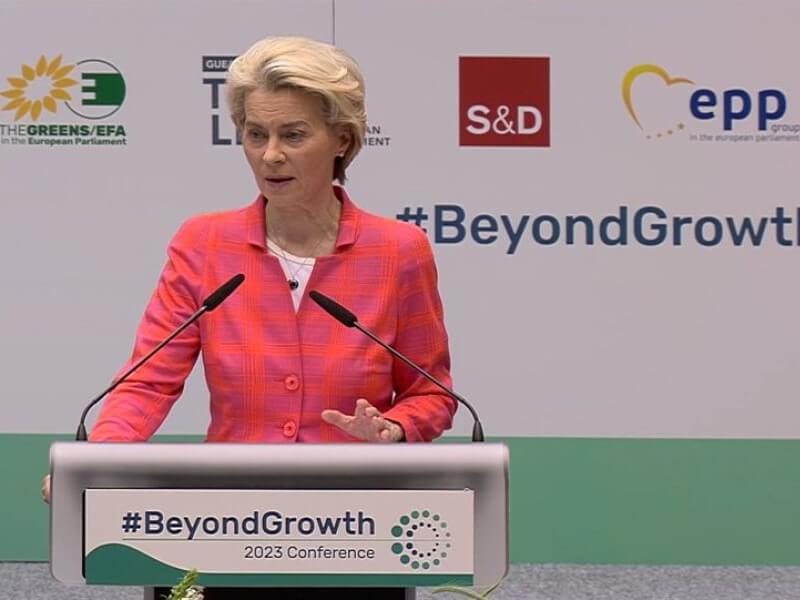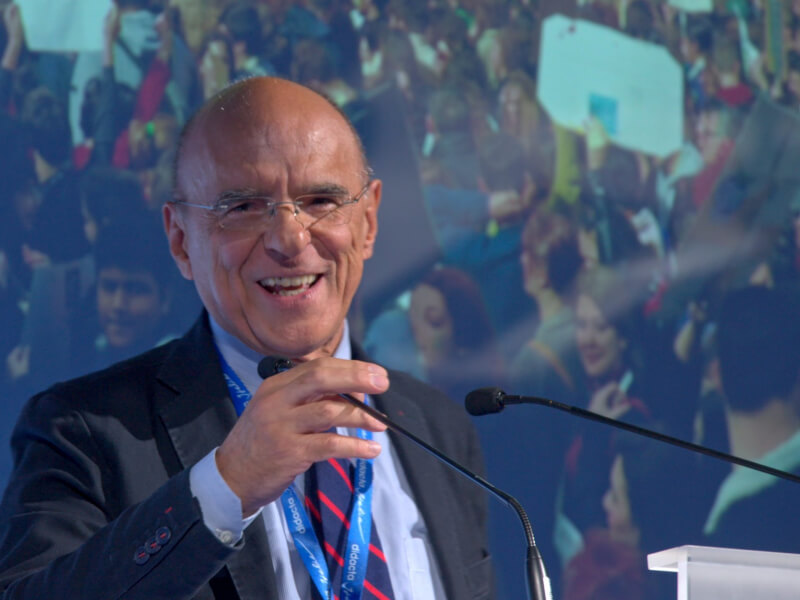17 May 2023 – Honourable Members, Ladies and Gentlemen,
Indeed, if we look back, a little over 50 years ago, The Club of Rome and a group of MIT researchers published The Limits to Growth report. It mapped the interaction between population growth, the economy and the environment. And 50 years ago, it came to a drastic conclusion: Stop economic and population growth – or else our planet will not cope. As you know, this report has sparked a long controversy. For instance, about the role of new technology in countering climate change.
But instead of prolonging these debates, I today want to concentrate on one point, and that is a point that the report got right beyond any doubt: That is the clear message that a growth model centred on fossil fuels is simply obsolete. This assessment has been confirmed, time and again. The recent IPCC report is just the latest reminder that we need to decarbonise our economies as quickly as possible.
And this is exactly why we put forward our European Green Deal. Building a 21st century clean-energy circular economy is one of the most significant economic challenges of our times. The European Green Deal is not only our plan to fight climate change and become the first climate-neutral continent. It is also our new European growth model for a prosperous, responsible and resilient economy. It is our blueprint for a systematic modernisation of Europe’s industry. Because in the long run, only a sustainable economy can be a strong economy. Only a sustainable economy has the resources to invest in a healthier and in a fairer tomorrow. Only a sustainable economy empowers us to reach the social targets we set ourselves at the Gothenburg and Porto Social Summits. Only a sustainable economy generates the means to accelerate research and development for clean technologies.
50 years ago, The Club of Rome could not completely envisage, for example, the potential of green hydrogen. It could not envisage that we might drive today’s electric cars. It might not be able to see the future we would have, for example with batteries from which we can recycle 95% of lithium, nickel and cobalt. It is not the daily procedure today, but we are able to do it. But already 50 years ago, the ‘Limits to Growth’ report acknowledged that while fossil-based growth was unbearable for the planet, humanity could devise a different growth model ‘that is sustainable far into the future.’
This is the mission that drives us today. This is the spirit of the European Green Deal. We do not have to start from scratch. Our compass in this endeavour are the long-standing values – the true values, if you get it right – of the European social market economy. Our social market economy was never exclusively about economic growth. It was always about human development. It never had the sole goal of market efficiency and liberalisation. To the contrary: The social market economy functions in the interest of the worker and the community. It opens opportunities, also to set very clear limits. It rewards performance but also guarantees protection for the big risks in life. Beyond growth, it focuses on public goods such as healthcare, education and skills, workers’ rights, personal security, civic engagement and governance – good governance. Our social market economy, if you get it right, encourages everyone to excel, but it also takes care of our fragility as human beings.
The values of the social market economy have driven us since the beginning of this Commission’s mandate. Within the European Green Deal, we have always strived to reconcile jobs with the protection of the most fragile people of our societies. Technological innovation with climate neutrality. And we have stayed true to this approach, even as new crises disrupted our everyday lives.
First, when the pandemic hit us. Our Recovery Plan, NextGenerationEU, has focused not only on restarting our economic activities after the lockdowns but also on transforming our economic model. With a push to decarbonising industries, energy and transport. With an emphasis on digital skills and digital infrastructure. With new investments for schools and hospitals. Beyond growth, NextGenerationEU takes care of the next generation’s future.
And then, last year, when Russian tanks rolled into Ukraine, and the Kremlin rolled out its energy blackmail against us, it was a tough year, it did shake us to the core. But not only did we guarantee Europe’s energy security – there were no blackouts – and protected vulnerable households and companies with a solidarity contribution from big energy providers, we also accelerated massively the transition to clean energy. And for the first time in history, in 2022, we generated more electricity from sun and wind than from gas and oil. While the CO2 emissions globally rose by 1%, in the European Union during the year 2022 we managed to cut emissions by 2,5% – despite the war. So this is the living proof: you can cut emissions and have a prosperous life. It is doable.
André Gide, a French writer and Nobel Prize winner once said: ‘One does not discover new lands without having the courage to lose sight of the old shores.’ In the 1970s, just one year after The Limits to Growth report was published, the big oil crisis began. Back then, our predecessors chose to stick to the old shores and not lose sight of them. They did not change their growth paradigm but relied on oil. And the following generations have paid the price. We also experience massive crises. We are choosing a different path, we are choosing to discover new lands. It is not trivial.
Today, we are leaving the fossil-fuel growth model behind us. The new lands are still blurred, but they are visible, we can reach them. We know that our children’s future depends not only on GDP indicators but on the foundations of the world we build for them. It was Robert Kennedy back in the 1960s who famously said that GDP ‘measures everything, except that which makes life worthwhile: the health of our children, or the joy of their play’. And I am sure had he given his speech today, Kennedy would have included the sound of birdsong and the joy of breathing clean air. Today, on a very fundamental level, we understand Kennedy’s wisdom. That economic growth is not an end in itself. That growth must not destroy its own foundations. That growth must serve people and future generations. This is exactly what you will discuss today and during the next two days.
So thank you for inviting me, and I wish you a very good conference.
Watch the speech here:
Copyright: European Union, 1995-2023
Learn more about Beyond Growth





